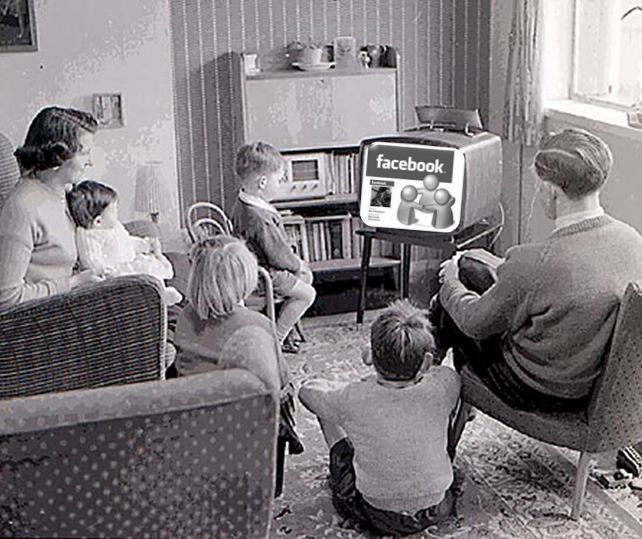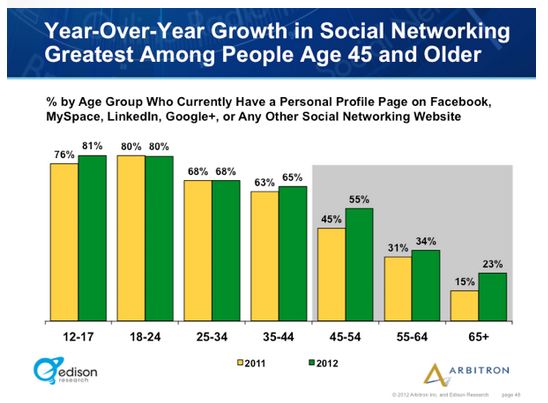Guest post by {grow} community member Tom Webster
My friend Mark Schaefer wrote a provocative piece in this very space yesterday about why Facebook will become the most dangerous company on earth. Perhaps he underestimated the problem.
One of Mark’s central observations — that a public company must find ways to grow, and Facebook’s only path to do that is through you and me — was particularly insightful and, for some, alarming. I’ve been studying Facebook for five years as a researcher, and after seeing our most recent data on social media behaviors I can tell you this: It’s scarier than you think.
In data that my company (Edison Research) just released yesterday, we found that 54% of all Americans age 12 and over have a personal profile on Facebook. This represents some modest growth over last year’s 51%, but not hockey-stick growth, so one might be tempted to see Facebook’s rise as slowing down, especially when that growth is trended over the past five years.
Not so fast. Numbers like “54%” don’t tell the full story.
First of all, it is important to know this: in the same report, we show the percentage of Americans 12+ who have a personal profile on any social network as 56%, and no other network is even remotely close to Facebook. When we talk about social media in this country we are talking about Facebook, plain and simple. The other thing to note about that 54% is it’s an average that masks some intriguing demographic disparities. Note the breakdown of social media usage by demographic below: (and remember, Facebook is used by 96+% of these Americans)
There are two important stories here.
The first speaks to the saturation that Mark wrote about, but in a different light. For the second year in a row, the growth for Facebook has really been people aged 45 and over. Indeed, the 12-34 demographic has largely been static since 2010. Certainly, it isn’t wrong to think that it’s pretty much all ashore that’s going ashore with younger demographics. And, as Mark correctly pointed out, as Facebook’s growth with older demos slows, the company will need to find ways to wring more data out of us in order to feed their shareholders’ insatiable hunger for growth.
The second story, however, is more subtle. As I noted earlier, usage by the 12-24’s haven’t really grown appreciably since 2010. But look where they are “stalled” — at an 80% adoption rate. Now, getting 80% of American youth to do anything is an unbelievably powerful construct to get your head around.
You can’t find any other media property remotely close to that. Heck, 80% of 12-24s don’t have smartphones, or landlines, or read the newspaper, let alone use any one brand or product. That 80% use of social media (i.e. Facebook) is remarkable, to say the least.
Eventually, those 24-year-olds turn 25, and those 34-year-olds turn 35, and so on. Gradually, as these younger demographics age into older demographics, they will take these learned behaviors with them. In that sense, it’s like smoking. Facebook has changed the behavior of Americans in their formative years, and they will take those learned behaviors with them.
With nearly 8 out of 10 young Americans making Facebook the hub of their online lives — and, thus, their lives — the ways in which they consume and share information have changed irrevocably.
Consider the number of Americans who have the “social habit” and check their profiles several times every day — while Facebook’s Edgerank algorithm prioritizes the information they receive based upon our personal interactions — and you can begin to see just how much sway Facebook holds over what we know as Americans. These 12-24s are literally growing up with the news and information they are exposed to being curated by their friends. And by Facebook.
As a parent I am keeping a wary eye on this. Garbage in, garbage out, as they say.
What do you think? Am I overreacting? What do you see in the data?
 Tom Webster is Vice President of Strategy for Edison Research, a custom market research company best known as the sole providers of Exit Polling data during U.S. Elections for all the major news networks. Webster specializes in drawing insight from social media data, and writes about these topics at www.brandsavant.com. Follow him on Twitter at @Webby2001.
Tom Webster is Vice President of Strategy for Edison Research, a custom market research company best known as the sole providers of Exit Polling data during U.S. Elections for all the major news networks. Webster specializes in drawing insight from social media data, and writes about these topics at www.brandsavant.com. Follow him on Twitter at @Webby2001.




